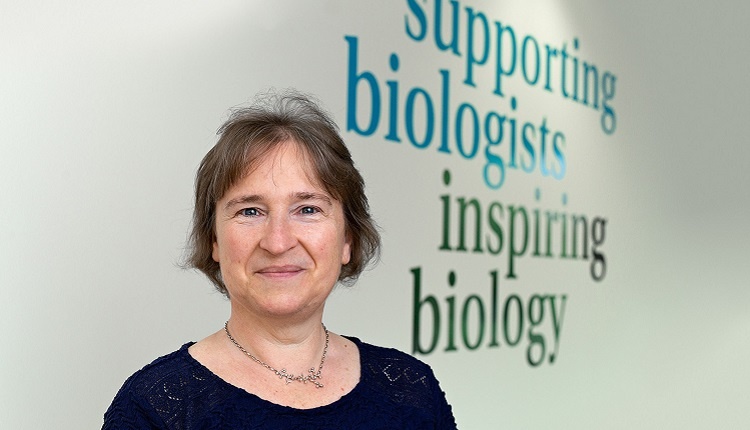Building the Future of the Biological Community: An Interview With the Company of Biologists

The biological sciences domain has seen a rapid growth in recent years with more and more researchers publishing and sharing their knowledge not only in journals but also in preprint platforms for the rest of the community to freely access.
In this interview, we will explore some of the innovative ways in which a publisher can build real community engagement around its journals, with a particular focus on early-career researchers.
The Company of Biologists was established in 1925 by renowned zoologist George Parker Bidder III with the aim of supporting and inspiring innovations within the biological community.
Today, we have with us Claire Moulton, Publisher at The Company of Biologists.
Could you give our readers a brief introduction to The Company of Biologists and some of its initiatives?
The Company of Biologists is a not-for-profit publishing organization with a mission to support biologists and inspire advances in biology. At the heart of what we do are our five specialist journals: Development, Journal of Cell Science, Journal of Experimental Biology, Disease Models & Mechanisms, and Biology Open. We take great pride in the experience of our editorial team and the quality of work we publish.
We believe that profits from publishing the hard work of scientists should support scientific discovery and help develop future scientists. Our grants help support societies, meetings, and individuals. Our workshops and meetings give researchers an opportunity to network and collaborate. It is also important to us that we support early-career researchers. We achieve this by hosting a number of community sites such as preLights and the Node that help bring people together.
The Company of Biologists: who we are and what we do from The Company of Biologists on YouTube
How important are preprints to The Company of Biologists?
Preprints play an important role in the rapid dissemination of research, followed by the validation of their findings through careful peer review before publication in scientific journals. Our journals were among the first to develop preprint-friendly policies that not only allow but encourage the posting of preprints. Furthermore, we also have in place bi-directional portals that allow authors to submit their work to bioRxiv and our journals in a single process. As the number of preprints started to grow, we decided to bring the community together to develop a new preprint highlighting service called preLights.
You can also check out our latest online webinar in collaboration with Enago on “A Researcher’s Guide to Preprints—Importance & Benefits to Authors”
How is preLights different from other preprint services for biologists?
preLights is wonderful because it’s a community that also provides a service. Our Community Manager works together with a vibrant group of early-career researchers, who have made the site their own. The preLighters select important preprints to highlight and then write a short piece (summary) outlining the key findings of the preprint, putting the work in context and, most importantly, explaining what it was about the preprint that sparked their interest. This leads the preLighters to pose questions about the research – and we are delighted that about half of the preprint authors then respond to provide further insights into their work, which constitutes a first step in the discussion of their findings. preLights has a high visibility within the community and a strong Twitter presence.
Being a preLighter from The Company of Biologists on YouTube
Can you tell us more about the impact that the “preLighters” have on the preLights site?
The preLighters are passionate advocates of open science and communication and have proposed new features for the site such as preLists, which allows the community to build topic-based lists of preprints, for example those resulting from a scientific conference.
As preprints have become such a strong element of the communications around COVID-19, a group of preLighters have developed covidpreprints.com, which identifies landmark preprints along the COVID-19 timeline, mapped alongside some of the key events of the pandemic.
This reflects preLights’ place as a true community endeavour.
How does the Node support researchers in the field of developmental biology?
The Node is a community site for and by developmental biologists. It’s a place to share news, discuss, and debate relevant scientific topics. It also includes an extensive jobs section and an events calendar. In collaboration with the British Society for Developmental Biology, we recently expanded our resource section to include advocacy, outreach, and teaching resources.
This year we responded to a community need by launching the Node Network, a global directory of developmental and stem cell biologists. Our community can use this network to find speakers, referees, panel members and potential collaborators, identifying those individuals who might not otherwise have come to mind.
Do you have other community sites on the horizon?
We are working on FocalPlane, a new community site hosted by the Journal of Cell Science, for anyone with an interest in microscopy. The site, which will be launched in summer 2020, will provide a trusted, curated, and centralized place to connect people, resources, and information within the microscopy community.
Developing sites like these cements the status of our journals as real community journals. They serve the whole biological community, but we’re particularly proud of the way they engage early-career researchers.
What other opportunities are offered by The Company of Biologists to early-stage researchers looking to enhance their careers?
Firstly, we provide financial support though a variety of grants. We offer Travelling Fellowships to graduate students and post-doctoral researchers wishing to make collaborative visits to other laboratories, often to learn a new technique. One journal, DMM, also offers conference travel grants. Moreover, we give large grants to several societies, who manage these funds on our behalf to offer travel grants to their members.
Secondly, we provide high-visibility opportunities at our scientific Workshops and Journal Meetings (having discounted or waived attendance costs). At our Workshops, early-career researchers have the same visibility as senior researchers in terms of presentation time and networking. We can’t wait to restart these after the pandemic lockdown.
The Company of Biologists Workshops – Places for early-career researchers from The Company of Biologists on YouTube
When combined with our community sites and social media outputs, this provides early-career researchers with valuable experiences, great visibility, and an opportunity to build close connections with others in the field.
Could you share more details about the grants provided by The Company of Biologists?
As a not-for-profit publisher, we’re delighted to offer a variety of community grants. These range from meeting grants for large and small meetings in the fields covered by our journals, to individual contributions towards collaborative visits and conference travel. We are proud to be a part of people’s journey as they travel the world to learn new techniques, establish new collaborations, and further their research.
Tell me about some of the recent achievements and major milestones for The Company of Biologists.
The Company of Biologists has a rich history and the last decade has been a very exciting one: we’ve created an inspiring series of scientific Workshops; launched our youngest journal, Biology Open; and developed our community sites, the Node and preLights. In publishing terms, we’ve embraced preprints, introduced format-free submission, and started publishing peer review reports. It’s also been a period of strong communication, especially through our social media channels, which has recently expanded to WeChat.
Some recent highlights include preLights being a finalist in the ALPSP Awards for Innovation in Publishing (2019) and our first Read and Publish deals, which give researchers at participating institutions unlimited access to our three subscription journals, as well as allowing free and unlimited Open Access publishing for all corresponding authors. Also, this summer, we look forward to the launch of FocalPlane.
And what about challenges or hurdles?
Well, at the time of this interview we’re in the middle of the COVID-19 pandemic lockdown, so we are working hard to support authors, reviewers, staff etc. through lab / office closures and other challenges. We’re trying to make sure there is as little disruption as possible to our publishing activities while offering flexibility, such as deadline extensions for manuscript revisions.
The challenge, then, is to continue with our business objectives such as ensuring we have Open Access options in place that allow all authors to comply with their funders’ new mandates. We’re also moving our journals to a new hosting platform, Silverchair, in 2021, which will give us greater flexibility as we evolve the ways in which we present content to our communities, enhancing our service to readers and authors. These are positive developments and it’s important to keep moving forward.
What are your plans for the future?
The Company of Biologists is looking forward to its 100th birthday in 2025.
Back in 1925, a group of biologists committed to putting money into founding the company – making us one of the very first crowd-funded initiatives. We have an interesting history and look forward to celebrating our achievements as we approach our centenary.
There will be some new initiatives too as we think about our role in a more sustainable future, so lots more to look forward to… and definitely watch this space!
It would be great if you could share a final piece of advice or some concluding tips for our readers.
I think I have to acknowledge the COVID-19 pandemic here, and the impact that it will have on people’s research, funding, and career plans (not to mention their private lives). Learn, experiment, build your networks, gain visibility – the advice is the same as always but how you go about it right now could be quite different. We’re all living in the virtual world at this moment in time, so make the most of opportunities while there are fewer material barriers. Join free webinars, data projects, online networks, virtual conferences… and really get involved. Your next idea, collaboration, or job offer could come from an unexpected interaction, so talk to people (and try even harder to listen). Feel good about yourself, be prepared to try something different and keep moving forward.
You can check out The Company of Biologists website and also follow them on Twitter @Co_Biologists
It was a great pleasure to talk to Claire Moulton. We sincerely thank her for taking the time to be a part of this interview and also wish her team all the very best in their future endeavors!









